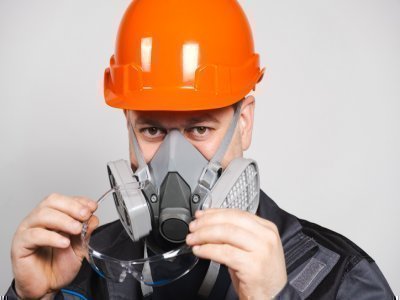The Importance Of Respiratory Fit Testing (Mask Fit Test)
If workers require tight fitting respiratory protection as part of their PPE, Respiratory Fit Testing is required to ensure the respirator is working correctly.
You are required to conduct Respirator Fit Testing:
- Before a respirator is selected or used for the first time
- At least once per year to ensure it continues to fit adequately
- Whenever there is a change in the wearer's facial characteristics or features which may affect the facial seal e.g. large weight loss or gain
The variance between a respirator that is suitable for the person and applied correctly and an incorrect fit can cause workers to be exposed to higher levels of contaminants than anticipated.
As a person conducting a business or undertaking (PCBU) you are required by OHS/WHS regulations to manage exposures to any airborne contaminants as far as reasonably practicable based on the hierarchy of control.
Protect your staff and your organisation by adhering to the regulatory requirements for Respiratory Fit Testing.
What Is The Purpose Of Respiratory Fit Testing (RFT)?
Respirator Fit Testing is conducted to ensure that your employees have maximum protection from airborne contaminants. The effectiveness of Respiratory Protective Equipment (RPE) relies on a good seal between the respirator and the wearer’s face. If there isn’t a good seal, contaminated air will leak into the respirator and the wearer may not get the level of protection that is needed. RFT is used to test tight fitting respirators.
JTA’s Respirator Fit Testing
Our testing covers:
- Correct Application
We check to see if the person wearing the respirator puts on the mask correctly and that it is being worn according to the manufacturer's instructions. This involves checking that the mask is not worn upside down or fastened incorrectly.
- Suitability
Tests are conducted to ensure the seal on the face is adequate and the respirator suits the user. People's faces vary significantly in size and shape and respirators are available in a wide range of shapes, styles, materials and sizes. This means that the fit of a respirator is personal and unique to each employee. It is important to find the most suitable tight-fitting respirator for each employee’s face so that they get the maximum level of protection.
We conduct our RFT onsite at your premises. The room should be quiet and private with power available. Each fit test will take approximately 10 to 20 minutes depending on the selected protocol. Learn more about our Respirator Fit Testing.
Respiratory Fit Testing Methods
There are two methods of RFT:
• Qualitative – a pass/fail test that relies on the wearer’s ability to taste or smell a test agent
• Quantitative – considered the gold standard as it is objective and uses specialised equipment to measure how much air leaks into the respirator
Our preferred option is to conduct quantitative testing as it is objective and more accurate. However, if the respirator isn’t suitable such as a full face mask, we will conduct qualitative testing.
Your Record Keeping Requirements
You should keep a written record of fit tests carried out for each worker, including:
- The type of test performed
- The make, model, style and size of respirator tested
- The date and result of the test
Complementary Services
JTA provides a range of air quality monitoring services, including:
We can meet your annual requirements for Respirator Fit Testing at the same time as we conduct any of the above services.
Fit Test vs Fit Check
A Fit Test has to be conducted by a competent person at least once per year. The competent person may be an Occupational Hygienist, safety professional, a company employee who has undertaken appropriate training or an external fit test service provider.
A Fit Check should be carried out by the wearer each time they put on the respirator to make sure it has been properly positioned on the face and there is a good seal.
If you have any questions about RFT call us on 1300 856 282









